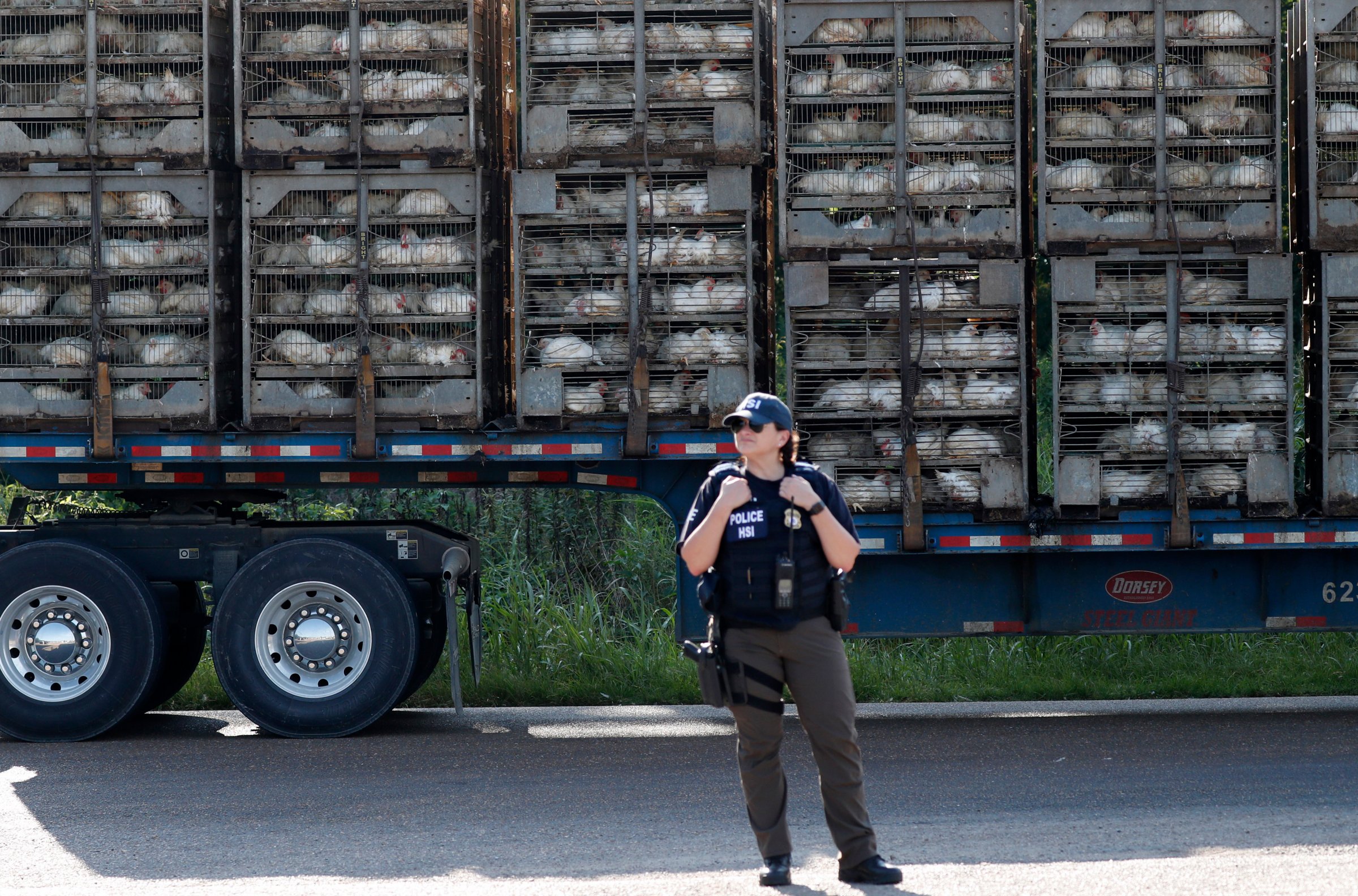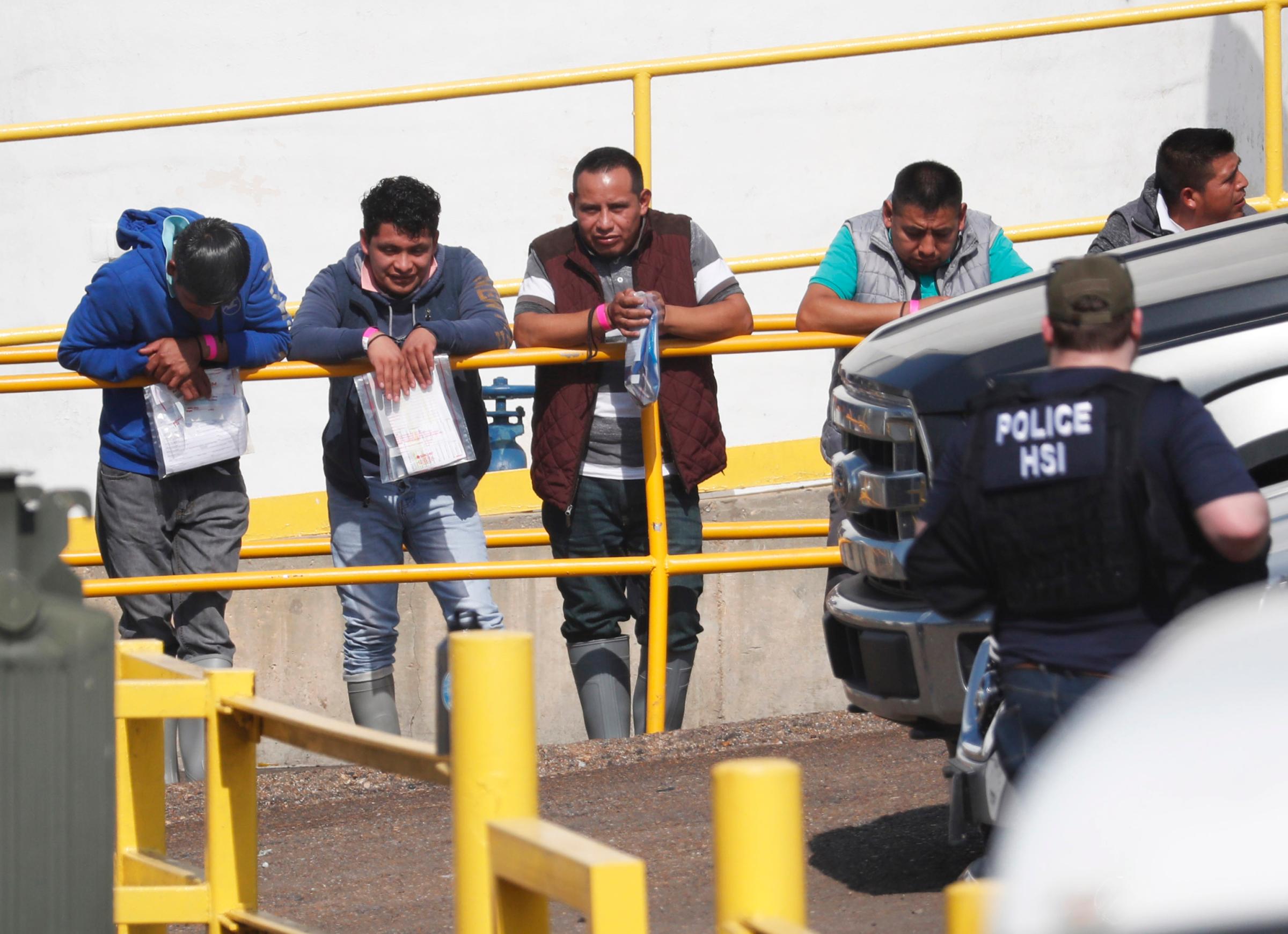
Hundreds of employees at seven worksites across Mississippi were swept up Wednesday in the largest immigration raid in at least a decade. Their employers are yet to be charged. They might never be. They typically aren’t.
Immigration and Customs Enforcement (ICE) arrested 680 people but has released just over 300 of them since then. Those who have been let go are still required to appear in court at a later date before a federal immigration judge, a spokesman for ICE tells TIME in an emailed statement
Although undocumented immigrants often face deportation in the aftermath of raids like these, the consequences faced by the employers who hire them are usually “really minimal,” Victor Narro, a project director with the UCLA Labor Center, tells TIME.
Just 11 employers were prosecuted for hiring undocumented immigrants between April 2018 and March 2019, and only three were sentenced to serve any prison time, according to an analysis by the Transactional Records Access Clearinghouse (TRAC) at Syracuse University. More than 120,000 people were prosecuted for illegal entry or reentry during that same time period.
However, federal court documents do mention several employment problems at the plants. Federal officials say evidence from electronic monitoring bracelets showed that people who had already been arrested for immigration violations, and others who were not allowed to work in the U.S. were working at all of the Mississippi plants raided. Documents unsealed Thursday in federal court allege that six of the seven plants were “willfully and unlawfully” employing undocumented immigrants and two of them appeared to be actively participating in fraud.
Per the Associated Press:
Investigators allege the most brazen fraud took place at two smaller chicken processing plants — PH Food Inc. in Morton and A&B Inc. in Pelahatchie. Sworn statements identify Huo You Liang of California, known to his Mississippi employees as Victor, as the owner of both.
A PH Food employee, acting as a confidential informant, told Homeland Security investigators that the vast majority of the 240 employees at PH’s plant in Morton and the 80 employees at A&B’s plant in Pelahatchie didn’t have proper work documents.
Asked whether employers may be charged in the case, a spokesperson at the Department of Justice said Friday in an emailed statement to TIME that “law enforcement operations can take time” but did not specify whether any case would be opened involving employers.

Two other plants raided on Wednesday belong to Koch Foods, one of the largest poultry suppliers in the world. The private company, which is headquartered in Illinois, agreed last year to pay a $3.75 million settlement after being slapped with a federal Equal Employment Opportunity Commission lawsuit that the agency filed on behalf of workers.
The company was charged with sexual harassment, national origin and race discrimination and retaliation against some Hispanic workers at a Morton, Miss. chicken processing plant, which employed more than 1,000 people. The EEOC alleged that supervisors touched or made sexually suggestive comments to female Hispanic employees, hit Hispanic employees and charged many of them money for “normal everyday work activities.”
The court eventually ordered Koch Foods to implement new policies aimed at preventing racial, sexual and ethnic discrimination and to create a 24-hour hotline for reporting discrimination complaints in English and Spanish.
Koch Foods did not respond to a request for comment Friday but a statement on their website says that “Koch Foods is cooperating with the government’s ongoing investigation.” It cited “being an early adopter of the government’s own E-Verify program which screens new hires through the Social Security Administration, as well as the Department of Homeland Security to ensure they are compliant.”
Labor unions have condemned the recent raids.
The United Food and Commercial Workers, which represents workers at a Koch Foods plant in Morton and a Peco Foods plant in Canton urged the “President and Congress to work together to fix our country’s broken immigration system.”
“Workers across this country are too scared to stand up for their rights and to report wage theft, dangerous work conditions, and other workplace issues,” said UFCW president Marc Perrone in a statement. “We must act now to end this dangerous climate of fear.”
Narro, the UCLA professor, says that this fear and exploitation is often made worse due to the threat of immigration crackdowns. He says the current system allows employers to continue making profits by exploiting low-wage workers and paying any negligible fines. It’s a calculated cost — and one that employers may be willing to pay without making any significant changes.
“If there are industries where workers have complained about working conditions, we should disconnect the immigration enforcement” policies, Narro says.
“The message needs to be clear: employers cannot violate the labor standards of the workplace because they feel like ICE is going to back them up,” Narro says. “That may be the Trump way of looking at this, but [it is] creating unsafe and very egregious working conditions.”

L. Patricia Ice, legal project director for the Mississippi Immigrants Rights Alliance, has worked with the state’s immigrant community for more than two decades and has visited several of the state’s chicken factories in that time. Poultry plants are one of the main employers in the area, Ice says.
“It’s wet in there. There’s chicken blood on the floor. People are cutting chickens into pieces. Then they’re packing the chickens in plastic wrap. It’s tedious,” Ice says.
“Poultry processing plants are really slaughterhouses. This is the work that none of us want to do,” Narro adds.
Koch Foods will hold a job fair in Mississippi on Monday, less than a week after the raids. Meanwhile, any undocumented workers who were caught up in the raids and later released likely cannot go back to their original jobs, Ice tells TIME. Government agencies will be watching these companies to make sure they do not rehire people without the proper papers, she explains.
“The person arrested may be the main breadwinner in his or her household,” Ice says, adding that they will be forced have to find work again in other industries, like construction or hospitality, because “you can’t stay without food for very long.”
“This is affecting everybody. My clients, they’re traumatized. That traumatizes me,” Ice says.
More Must-Reads from TIME
- Cybersecurity Experts Are Sounding the Alarm on DOGE
- Meet the 2025 Women of the Year
- The Harsh Truth About Disability Inclusion
- Why Do More Young Adults Have Cancer?
- Colman Domingo Leads With Radical Love
- How to Get Better at Doing Things Alone
- Michelle Zauner Stares Down the Darkness
Write to Sanya Mansoor at sanya.mansoor@time.com